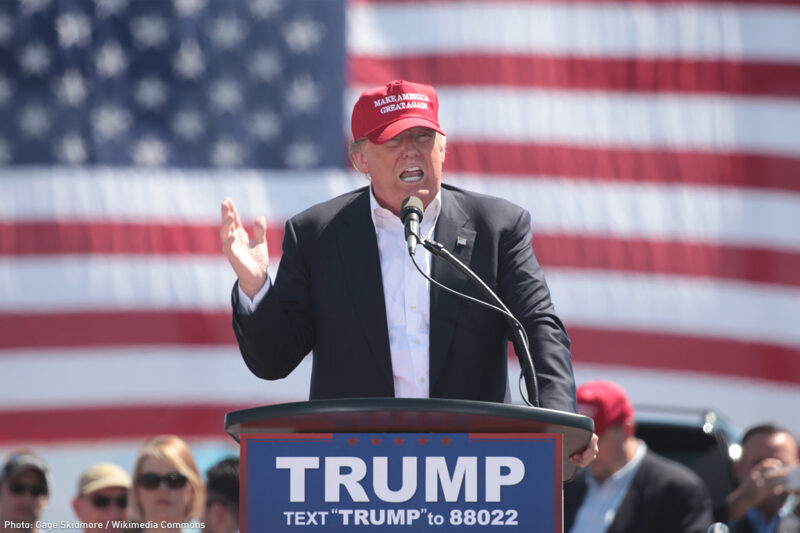President Trump‚Äôs Campaign Promises Stick With Us ‚ÄĒ They Should Stick With Him, Too


This piece originally appeared at .
The ongoing travel ban litigation has triggered intense debate on whether an assessment of the ban‚Äôs constitutionality must be limited to the‚Äúfour corners‚ÄĚ of President Trump‚Äôs revised executive order. This is partly because there is little else to discuss. Given the Trump Administration‚Äôs many anti-Muslim statements, it‚Äôs hard to imagine how the ban could be upheld by any court that gives serious weight to that evidence. Indeed, the few judges who have suggested that the ban might survive judicial review have largely declined, in the words of Ninth Circuit Judge Jay Bybee, to look ‚Äú‚ÄĚ of the executive order itself.
As several commenters , including the ņŌįń√ŇŅ™ĹĪĹŠĻŻ‚Äôs David Cole, the strict ‚Äúfour corners‚ÄĚ view is wrong. In assessing whether the travel ban is constitutional, to its broader anti-Muslim context.
But does the relevant context include everything the Trump Administration has said?
In a just filed with the Fourth Circuit, the government argues that campaign statements should carry essentially no weight. Versions of this argument have also been advanced by Ninth Circuit Judge and The New Yorker’s .
Of course, even if only the executive order‚Äôs four corners are considered, the ban is still unconstitutional. But it‚Äôs worth asking whether a special rule for campaign statements, which might be called ‚Äúfour corners lite,‚ÄĚ has merit.
In the government‚Äôs view, campaign statements ‚Äú‚ÄĚ about the motives of President Trump‚Äôs actions in office. Judge Kozinski has warned that if campaign statements are deemed to be evidence in court, politicians‚Äô free speech in electoral contests . And in Toobin‚Äôs telling, courts that consider campaign statements are unfairly ‚Äú,‚ÄĚ because campaign statements can be improvised and informal.
It’s true that campaign statements deserve special consideration. But their special qualities don’t make them less relevant than other presidential statements. If anything, the opposite is true.
If candidates know in advance that courts will ignore campaign rhetoric, they will be freer to ride to office (or even re-election) on a wave of hatred and prejudice.
First, campaign statements often provide a clear window to the candidate‚Äôs true intent. For example, in 2007 the Fifth Circuit affirmed a verdict against a Louisiana district attorney who, shortly after taking office, replaced more than 50 white employees almost exclusively with Black people. Although the district attorney advanced race-neutral reasons for these decisions, he had pledged during his campaign to make his staff‚Äôs ‚Äúracial composition‚ÄĚ more reflective of his parish‚Äôs population. In affirming the jury‚Äôs finding that the district attorney had engaged in unlawful discrimination, the Fifth Circuit noted that his actions were connected to this discriminatory ‚Äú.‚ÄĚ
The travel ban‚Äôs connection to a discriminatory campaign promise is even clearer. President Trump‚Äôs Muslim ban proposal wasn‚Äôt improvised; it was a ‚Äúfor a total and complete shutdown of Muslims entering the United States until our country‚Äôs representatives can figure out what is going on.‚ÄĚ That call is still on the Trump ; in fact, it was in November 2016 after being briefly taken down. So which is more probative of the president‚Äôs true intent: his formal campaign promise or briefs from lawyers given the unenviable task of laundering the president‚Äôs intentions? The answer is obvious.
Second, campaign statements often send the strongest messages to the public, and those messages make a difference under the Constitution. As explained by District Judge Derrick Watson in Hawaii in his recent decision enjoining the revised executive order, the Establishment Clause prohibits government action that ‚Äú‚ÄĚ favoring one religion over another. Immediately following that decision, President Trump confessed that he wanted to ‚Äú.‚ÄĚ As messages go, President Trump‚Äôs campaign pledge to ban Muslims, and his reaffirmation of that pledge as president, speak far more loudly than any post-hoc memo claiming that the ban is really about national security.
Third, over the long term, giving presidents a free pass for discriminatory campaign statements could damage our democracy. Far from chilling speech, if we hold candidates to their words, we should be concerned about facilitating discrimination by exempting entire categories of political speech from ordinary methods of proving intent. That’s because what is at stake in the travel ban litigation is not just whether President Trump will be held accountable for his past campaign statement but also whether politicians in future campaigns will have to worry that promising unconstitutional actions will come back to bite them in court when, as public officials, they seek to make good on those promises.
If candidates know in advance that courts will ignore campaign rhetoric, they will be freer to ride to office (or even re-election) on a wave of hatred and prejudice. They‚Äôll just need to remember to use magic words like ‚Äúnational security‚ÄĚ when converting prejudicial campaign promises into concrete policy bludgeons.
Campaign statements are important to candidates and meaningful to the public; they should not be disregarded by courts. President Trump’s campaign statements represent a true expression of the travel ban’s discriminatory purpose. They are a loud delivery of Trump’s anti-Muslim message. And they are a frightening roadmap for how would-be demagogues might use one story to win elections and a contrary story to win cases.
Courts that call out these problems aren‚Äôt using campaign statements to play ‚Äúgotcha‚ÄĚ with President Trump. They are ensuring that each and every president will not use campaign statements to play games with the Constitution.

